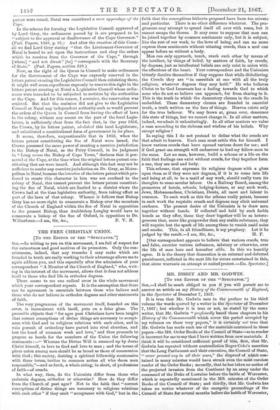THE FREE CHRISTIAN UNION.
[To THE EDITOR OF THE "SPECTATOR."]
SIR,—In writing to you on this movement, I am full of respect for the earnestness and good motives of its promoters. Only the con- sciousness, indeed, that any remarks I may make which are founded in truth are really working to their advantage allows me to again address you, and this especially after the admission of your correspondent " A Member of the Church of England," who, writ- ing in the interest of the movement, allows that it does not address itself to those who find life in orthodox dogmas.
There seems to me one radical error in the whole movement which your correspondent repeats. It is the assumption that there can be agreement in essentials between those who believe and those who do not believe in orthodox dogmas and other statements of faith.
The very programme of the movement itself, founded on this error, is inconsistent with itself, puts on a false gloss. The preamble objects that "for ages past Christians have been taught that correct conceptions of divine things are necessary to accept- ance with God and to religious relations with each other, and in vain pursuit of orthodoxy have parted into rival churches, and lost the bond of common work and love," and then proceeds to propose as bonds for the members of the Union the following
statements Whereas the Divine Will is summed up by Jesus Christ himself, in love to God and love to man ; and the terms of pions union among men should be as broad as those of communion with God ; this society, desiring a spiritual fellowship coextensive with these terms, invites to common action all who deem men responsible,"—and so forth, a whole string, in short, of professions of faith—of creeds.
In what way, then, do the Unionists differ from those who maintain dogmas, orthodox or otherwise? How do they differ from the Church of past ages? Not in the faith that "correct conceptions of divine things are necessary to religions relations with each other" if they omit "acceptance with God," but in the
faith that the conceptions hitherto proposed have been too minute and particular. There is no other difference whatever. The pro- gramme may attempt to spread itself all over with roses, but it cannot escape the thorns. It may seem to suppose that men can be joined together by common sentiments only, but it is subject, like the rest of our work, to the laws of being, and can no more express these sentiments without uttering creeds, than a soul can appear before us without a body.
Men can only approach, touch, reach each other by means of the intellect, by things of belief, by matters of faith, by creeds, by dogmas, just as intellectual beliefs can only exist in union with the affections of the heart. Your correspondent and the Unionists bitterly deceive themselves if they suppose that while disbelieving the Creeds they are " in essentials at one with all the truly religious, whatever dogmas they may hold." He who believes Christ to be God Incarnate has a feeling towards God to which none who do not so believe can approach, far from sharing in it. This is the truth in which the damnatory clauses in the creeds lie embedded. These damnatory clauses are founded in essential truth, a truth written on the face of things. Heaven exists only for the true believer. We may frown at, groan over, denounce this state of things, but we cannot change it. In all other matters, indeed, we admit it unhesitatingly. In all other matters we value a man according to the richness and wisdom of his beliefs. Why except religion ?
In saying this I do not pretend to define what the creeds are that admit to heaven. Each man must settle this for himself. I know various creeds that have opened various doors for me ; and if God grant me strength will endeavour to lead my fellow-men to the same. Let no man, however, build a scheme or a life on the faith that feelings can exist without creeds, for they together form a one, they are soul and body.
This scheme, that expresses its religious dogmas with a gloss upon them as if they were not dogmas, if it is to come into life and being at all, to be a maid of any work, should really turn its thoughts to some secular labour. On a Railway Board, among the promoters of hotels, schools, lodging-houses, or any such work, Jews, Mohammedans, Christians, Deists, all meet and labour in common. To such work as this the scheme really points, because in such work the requisite creeds and dogmas may elicit universal credence. The present desire of the Unionists is to draw mew together without bonds. If collected and held by such feeble bonds as they offer, those they draw together will be so hetero- geneous that, more like gunpowder than any stable substance, they will require but the spark of life among them to vanish amid noise and smoke. This, in all friendliness, is my prophecy. Let it be judged by the result. —I am, Sir, &c., H. F.
[Our correspondent appears to believe that various creeds, true and false, exercise various influences, salutary or otherwise, over the life of man here and hereafter alike. In this we heartily agree. It is the theory that damnation is an external and deferred punishment, inflicted in the next life for errors entertained in this, that alone warrants an attempt at united protest.—ED. Spectator.]






































 Previous page
Previous page